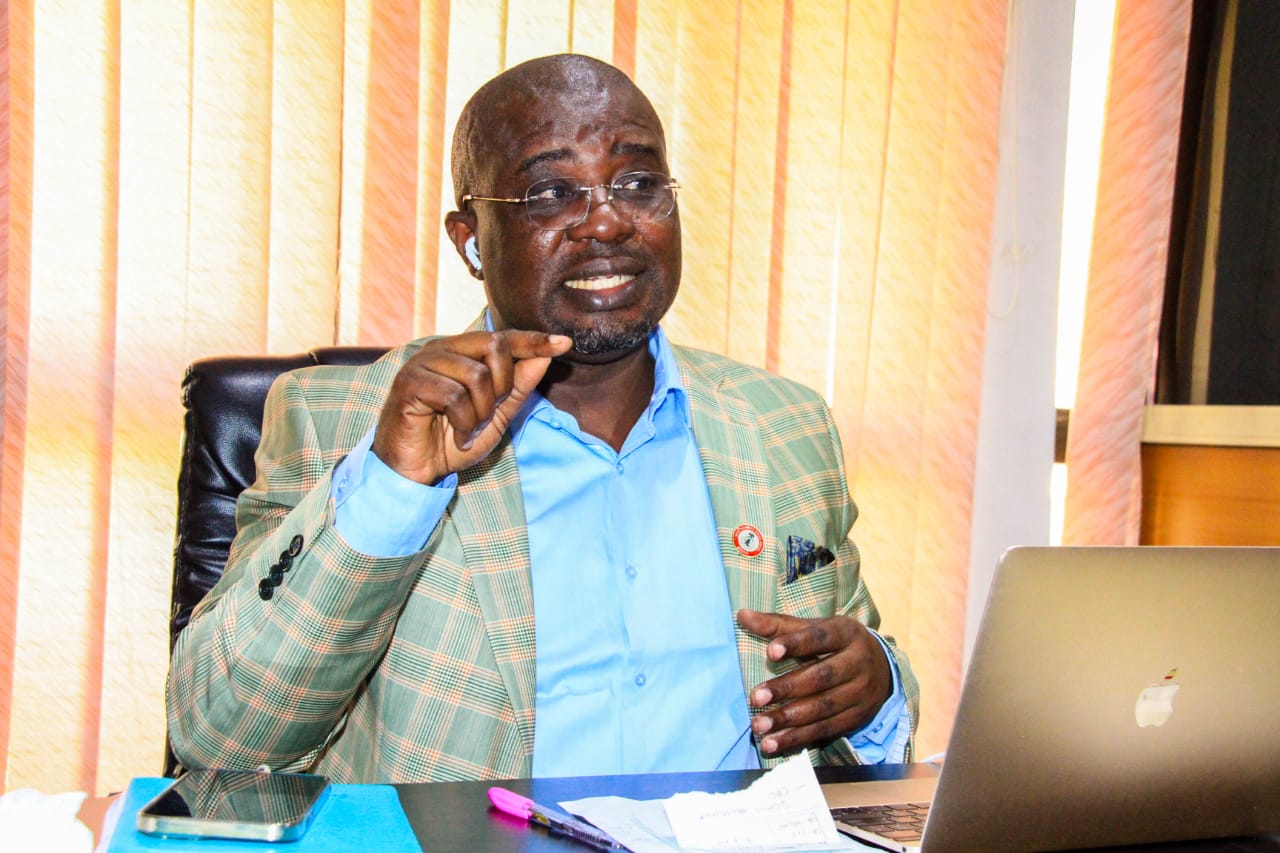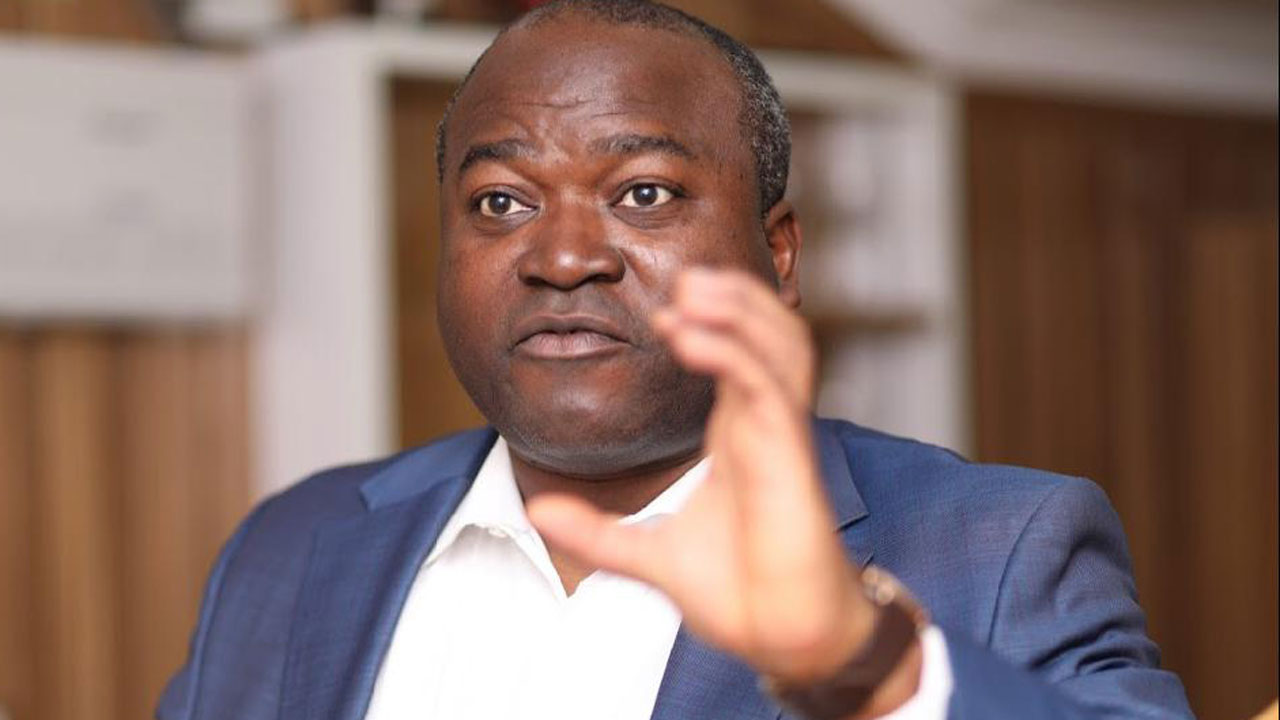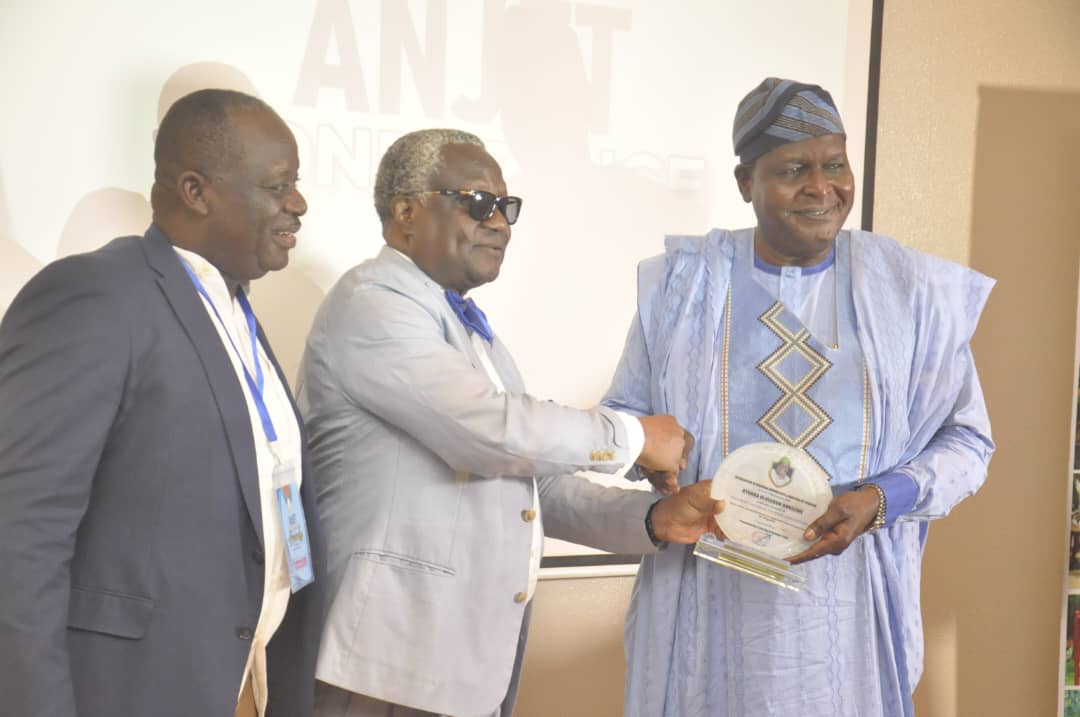Personality in Focus
The Problem of Drugs in Nigeria is Enormous, But Marwa is Tackling Them – Femi Babafemi

Since January 2021, when the National Drug Law Enforcement Agency (NDLEA) came under the leadership of Brig. Gen. Mohamed Buba Marwa (retd) as the new Chairman/CEO, the agency has received a new burst of life. The number of arrests and drug seizures that were made in the past eight months has probably never been made in the past 30 years of existence of the security agency. With more than two million kg of illicit drugs seized, 5000 drug traffickers arrested and over 500 convictions, the former Military Administrator of Lagos state have proven that he is the round peg in the round hole when it comes to fighting drug crimes. He has also affirmed the confidence reposed on him by the President Muhammadu Buhari who gave him the job.
It will be recalled that until his appointment early January 2021, Brig. Gen. Buba Marwa (retd) was the Chairman of the Presidential Advisory Committee for the Elimination of Drug Abuse (PACEDA) spanning 2018 – 2020. This position probably allowed the retired Army General to have an on-the-spot assessment of the decadence which has eaten deep into the fabric of the nation. The country is said to have 15 million citizens abusing drugs.
In his exclusive interview with the National President of National Association of Online Security News Publishers (NAOSNP), SAMSON OKI, in his Abuja office, the Director of Media and Advocacy, NDLEA Headquarters, Abuja, Mr. Femi Babafemi disclosed more on the performance and potentials of the National Drug Law Enforcement Agency (NDLEA). He spoke on the role that parents and the general public can play so that the country can cut the rate of drug abuse and addiction.
NAOSNP: The NDLEA has received new life under the leadership of Brig. Gen. Mohammed Buba Marwa (retd). Tell us ‘how has he been able to bring about this new reality’?
Femi Babafemi: With the coming of Gen. Marwa January of this year, it has changed a lot of things on ground in NDLEA and the best way to show this is to give an overview of what is being happening between January and now, either in the area of operations, administration, or two major plans of the agency which is drug supply reduction and drug demand reduction.
Talking about drug supply reduction, the agency has for the past 5-6 months arrested over 5000 drug traffickers from whom more than 2 million kg of drugs have been seized. Out of this arrest, we have had more than 500 convicted in court. We have 3000 still facing charges.
As I speak with you, we have counseled, rehabilitated, and reintegrated back into the society a total of 2,772 of those that abuse drugs. What this shows is a fair balance between efforts on drug demand reduction and drug supply reduction.
In the area of drug demand reduction, we are also advocating that people should undergo drug test. This is basically to ensure that those that are not yet on drugs are prevented from going on drugs and those that have started to make sure that they are discovered early and treated because the earlier we discover, the better for you because you can seek treatment.
This is why the Chairman has been advocating drug test for intending couples, students – fresher and returning, those seeking public office, workers, so that we can save quite a number of people from slipping into the cycle of drug abuse. Approximately 15 million Nigerians are abusing drug in the country.
NAOSNP: How have you been able to keep the officers and men of the NDLEA motivated for this task?
Femi Babafemi: In the areas of administration, the new leadership met a number of issues on ground. One of them is the issue of career stagnation of officers and men and that was why one of the first things that the Chairman did was to set up a Harmonization Committee and the result of that was promotion of 3506 officers of the agency which is about 70% of the workforce. As I speak with you, there are efforts on that regard as another committee is sitting on how to resolve the issue of harmonization of ranks and promotion of officers and men. We also talk of some of the liabilities met on ground in terms of payment of entitlement to officers and men and death and burial expense to families of deceased officers. Efforts are ongoing and by tomorrow, families of 188 deceased officers will be paid their burial entitlement that has been hanging since 2014/15.
All of these are been done by the leadership to motivate and encourage officers to do their work. That is why today, you will see everyday arrests and seizures at the seaport, airport, land borders, on the roads and across the country. What we do give out in our statement to the public is probably 0.1% of the figure of our arrests and seizures because we don’t want to bore the public. We just pick a few of what we think are a representative of the work of the agency so as to get the people informed.
We are glad that Nigerians now know the enormity of the problem of drugs in our country. The agency is not relenting yet because the agency has the support of the President, the highest authority in the country who is supporting the Chairman in every way possible and that is why we are going all out.
NAOSNP: In Nigeria, we have the issue of ‘crime fighting back when it is been tackled’, what are you doing to ensure that criminals don’t attack your men and officers?
Femi Babafemi: The work of the agency is intelligence-based. One of the things that the Chairman has done is to strengthen our Directorate of Intelligence to make them proactive, to make them respond to threats, but beyond that he has also created an Elite Strike Force which are well-trained, heavily armed, and is headed by a Director.
These are part of the things that the Chairman is doing to reinforce the confidence of the officers when they are going for operations and again to protect and secure vital installation and premises of the agency as well as other officers in their various assignments.
NAOSNP: In Nigeria, we have the issue of ‘strong men but not-strong institutions’, Nigerians are hopeful that this giant strides will not end with the tenure of Brig. Gen. Marwa, what are you putting in place to ensure that NDLEA will continue to be a strong institution beyond now?
Femi Babafemi: This is one of the things we are hoping that will happen. That is why whatever is being done now is building solid and strong structures for an institution that is already over 30 years old. There is quite a lot of concerted efforts been put in place to build strong structure for the agency so that whoever is going to come after him will have something solid to build on.
NAOSNP: Talking about the incessant rate of addiction among youths, how do we nip it in the bud?
Femi Babafemi: There are quite a number of factors responsible for this and I tell you that the consciousness is there now because of the volume of arrests and seizures. Prior to January, we didn’t realize it but the problem had been there. But because we are hearing of arrests and seizures know that is why everyone is surprised that the issue is this much.
Quite a number of factors are responsible. One of them is poor parenting because for every problem, there is a root in the family level. And for the solution also, it must also start from the family level. When parents abdicate their responsibility to bring up their children, for example, a parent sending children to bring alcohol or drugs is indirectly encouraging the child to take the same thing.
Some parents also don’t bother when they see changes in the attitude of their children. For instance, if your kids that you usually watch TV together is withdrawn into the room and you are not bothered to ask questions. When your child is avoiding eye contact with you meaning he is trying to prevent you from checking the redness of his eyes or hide something from you. Or suddenly your children start moving in the company of strange fellows. These are red flags that parents overlook to find out what is wrong and by the time they know, the kids are neck deep into drugs.
We also have the issue of peer pressure. They want to try what their friends do. Social media influence is another. When they see what celebrities do, yet some of them may just be doing it for the sake of the arts performance, some of these young ones go and try it and that is how we have a generation of addicts.
Then, we cannot run away from socioeconomic issues that lead people into drug abuse and addiction. They take drugs to forget their sorrows but drugs will only give relief for hours but at the end when the drugs wear out, the problem is still there. Why do you have to compound your problem because the drug will affect your physical health? Some may even affect mental health.
NAOSNP: What more are you doing to end the scourge?
Femi Babafemi: Fortunately, we are not folding our arms. We are doing as much as possible to cut access to these drugs. That’s why you see the volume of drugs that we are mopping up from the streets. We are even destroying the farms and those concealed inside the forests. By the grace of God and with the people buying-in and taking ownership of the fight, it will be much easier to win that leaving it alone for NDLEA. We believe that we may all end up as victims if we don’t all join hands to make sure that we rid our homes, communities, and country of this scourge.
Personality in Focus
Lagos Police Celebrate Ayo Ogunsan on Appointment As LSSTF Boss

The Lagos State Police Command, under the leadership of the Commissioner of Police, CP Olohundare Jimoh, has extended its heartfelt congratulations to Dr. Ayo Ogunsan on his well-deserved appointment as the Executive Secretary of the Lagos State Security Trust Fund (LSSTF).
In a statement signed by the Command’s Public Relations Officer, SP Abimbola Adebisi, and made available to the National Association of Online Security News Publishers (NAOSNP), the command noted that “Dr. Ogunsan’s appointment is a clear testimony to the unwavering trust and confidence that the Governor of Lagos State, Mr. Babajide Sanwo-Olu, has in him.”
Reminiscing Ogunsan’s trajectory in the world of administration and security, the statement stressed that “Over the years, Dr. Ogunsan has demonstrated exceptional selflessness and commitment to strengthening the security architecture of Lagos State.”
The Command further noted as follows:
“The Commissioner of Police is confident that Dr. Ogunsan, as a distinguished member of the LSSTF Board, will assume this new role with deep institutional knowledge, proven integrity, and unwavering dedication, coupled with a strategic understanding of the security needs of Lagos State. The Command has no doubt that he will deliver on his mandate successfully.
“Dr. Ogunsan’s continued valuable contributions to the LSSTF and his longstanding partnership with security agencies across the State have positioned him exceptionally well to steer the Fund towards greater operational efficiency, an outcome that will undoubtedly enhance public safety and security throughout Lagos State.
“The Lagos State Police Command once again warmly welcomes his appointment with deep optimism and hereby assures the new Executive Secretary of its unwavering partnership and cooperation. The Command is proud of him and immensely happy to be associated with him.
“The Lagos State Police Command looks forward to further strengthening the existing synergy, support, and operational collaboration with Dr. Ayo Ogunsan and the LSSTF team in ensuring the continued safety and protection of all residents and visitors in Lagos State.”
Prior to his appointment, Ogunsan was a Board Member of the Trust Fund.
Personality in Focus
COAS Shakes Up Army Hierarchy, Appoints New Principal Officers, Commanders

The Chief of Army Staff (COAS), Lt. General Waidi Shaibu, has approved the appointment of some senior officers to top strategic command and positions, aimed to strengthen command structures and reposition the Nigerian Army for heightened operational effectiveness.
According to a statement by Army’s spokesperson, Lt.-Col. Apollonian Anele, on Thursday, the appointment cut across key command, staff and instructional positions across formations, units and training institutions of the Army.
Among the new appointees are: Major General Bamidele Alabi, who has been redeployed to Army Headquarters Department of Policy and Plans and appointed Chief of Policy and Plans (Army); Major General Jamal Abdulsalam, formerly Chief of Special Services and Programmes at Army Headquarters proceeds to Defence Headquarters Department of Operations as Chief of Defence Operations while Major General Peter Mala moves from Office of the National Security Adviser to Headquarters Training and Doctrine Command Nigerian Army (TRADOC) as Commander.
Major General Samson Jiya, from Nigerian Army Heritage and Future Centre (NAHFC) moves to Defence Headquarters Department of Defence Accounts and Budget as Chief of Defence Accounts and Budget.
Other strategic appointments include, Major General Mayirenso Saraso from NAHFC to Army Headquarters Department of Operations as Chief of Operations (Army); Major General Isa Abdullahi from Defence Headquarters to Army Headquarters Department of Administration as Chief of Administration (Army); Major General Musa Etsu-Ndagi from Army Headquarters to Department of Training to Army Headquarters Department of Civil-Military Affairs as Chief of Civil-Military Affairs. Major General Abubakar Haruna from NAHFC to Nigerian Army Training Centre (NATRAC) Kontagora as Commander and Major General Philip Ilodibia from Army Headquarters Department of Policy and Plans to Defence Space Administration as Chief of Defence Space Administration.
Others are: Major General Godwin Mutkut, from Multi-National Joint Task Force (MNJTF) N’Djamena to Headquarters Infantry Corps Centre as Corps Commander Infantry, Major General Umar Abubakar from the Ministry of Defence to Headquarters Nigerian Army Armour Corps as Commander Armour Corps, Major General John Adeyemo moves from Nigerian Army School of Artillery (NASA) to Headquarters Nigerian Army Corps of Artillery as Corps Commander Artillery and Major General Mohammed Abdullahi from Nigerian Army Cyberwarfare Command to Headquarters Nigerian Army Signals as Corps Commander Signals.
Also, Major General Taofik Sidick has been redeployed from the NAHFC to Headquarters Nigerian Army Finance Corps as Chief of Accounts and Budget (Army), Major General Abdullahi Ibrahim from NAHFC to Headquarters Nigerian Army Ordnance Corps as Corps Commander Ordnance, Major General Adeyinka Adereti from Defence Headquarters to Headquarters Nigerian Army Electrical and Mechanical Engineers as Corps Commander, Major General Nansak Shagaya from Army Headquarters Department of Operations to Headquarters Nigerian Army Corps of Supply and Transport as Corps Commander Supply and Transport while Brigadier General Yusha’u Ahmed has been appointed acting Corps Commander Education.
The COAS also approved the appointment of Major General Oluyemi Olatoye, from Headquarters 82 Division/ Joint Task Force South East Operation UDO KA to the Nigerian Defence Academy (NDA), Kaduna and appointed Commandant, Major General Emmanuel Mustapha from Defence Space Administration to Nigerian Army Signal School as Commandant, Major General Adamu Hassan from Nigerian Defence Section, Riyadh, to Nigerian Army School of Artillery as Commandant and Brigadier General John Bulus from Headquarters Nigerian Army Finance Corps to Nigerian Army School of Finance and Accounts as Commandant.
According to the statement, the senior officers appointed as field commanders includes, Major General Saidu Audu from Army Headquarters Department of Training to Multi-National Joint Task Force (MNJTF), N’Djamena, as Force Commander, Major General Warrah Idris from Defence Headquarters to Joint Task Force North West Operation FANSAN YAMMA as Commander and Major General Oluremi Fadairo from Army Headquarters Department of Civil Military Affairs to 82 Division Nigerian Army, Enugu as General Officer Commanding and Commander Joint Task Force South East Operation UDO KA.
Other appointees are Major General Olatokumbo Bello as the Director Defence Media Operations at Defence Headquarters while Brigadier General Samaila Uba was redeployed from the Armed Forces Command and Staff College Jaji to Defence Headquarters as Director Defence Information.
The CIAS charged the new appointees to bring to bear their wealth of operational experience, administrative acumen and strategic foresight in driving a disciplined and combat-ready Army to decisively confront the contemporary and emerging security challenges.
He urged them to sustain the current operational momentum, strengthen interagency collaboration and remain unwavering in upholding the Nigerian Army’s core ethos of loyalty, selfless service, integrity and excellence.
Personality in Focus
Runsewe Bags ‘Pillar of Nigerian Tourism and Culture’ Award

Former Director General of the National Council for Arts and Culture (NCAC) and the Nigerian Tourism Development Authority (NTDA), Otunba Segun Runsewe, has bagged the award of Pillar of Nigerian Culture and Tourism.
The award was conferred on him by the Association of Nigerian Journalists and Writers of Tourism (ANJET), the umbrella body for Nigerian travel press, on Thursday, October 23 at a colourful ceremony held at the prestigious Sheraton Lagos Hotel and Towers.
He was among some distinguished Nigerians from public and private sectors, including the former Nigerian Minister of Tourism and Culture, Ambassador Frank Ogbuewu, who were honoured for their contributions to the growth and development of Nigerian tourism.
Other distinguished Nigerians conferred with awards were: Otunba Wanle Akinboboye (Foremost National Tourism Builder and Creative Mind), Mr. Jemi Alade (National Trailblazer in Inbound Tour Operation) Engineer Tarzan Ganiyu Shekoni Balogun (National Icon in Tourist Boat Operations and Water Transportation), Mr. Nkereuwem Onung (Icon of Consistency and Resilience in National Tourism Leadership), and Chief Abimbola Bode-Thomas (Hospitality and Tourism Management Amazon).
Speaking on the award conferred on Runsewe and the other awardees, the President of ANJET Mr. Okorie Uguru said the awards aim to promote the culture of service to the people, and also showing appreciation to those who have served the nation with distinction while holding public office.
He said: “It is not about celebrating those who are serving the country now, but showing appreciation to those who have served in the past, to challenge current political office holders to put in their best.
“The individuals and distinguished Nigerians we are honouring are among the people that built the visibility and growth the tourism industry is enjoying today… They have contributed, and are still contributing to the sector.
“As holders of institutional memories and archivists of this industry, we know the roles they have played and are still playing in the development of the Nigerian tourism industry. That is why years after some of our awardees have left public offices, we still call them to bestow this honours.”
While receiving the award, Runsewe lamented the inability of Nigeria to take tourism seriously. He said: “I stopped talking for some time because there are too many talks in tourism, there is no action. We come; we speak big English and go back. Today, I am going to reveal two or three things. The last time I came out was to speak to the new executives of the Federation of Tourism Associations of Nigeria (FTAN). For me, I am almost tired of talking, because there is no action.
“Let me first of all thank Ambassador Ogbuewu today. He said he does not want to come, so I urged him to come. It is only the living that can be celebrated. Let us thank God that during our lifetime, we are being celebrated. It is not everybody that has that opportunity.
“I can stand anywhere and talk about this industry. I do not need a book.
“Ambassador Ogbuewu you would recollect that President Obasanjo took your very good self, led a delegation to Trinidad and Tobago. That was the day Obasanjo made a statement, he said ‘I going to stand on the existing protocol’. That was the first time they heard that English. The then president of Trinidad asked, ‘what is he talking about.’ That is a tourism brand.
“People do not understand tourism yet. People think it is only about moving from one place to the other. No. Let me reveal a few things: how many of us know the late Pastor T.B. Joshua. T.B. Joshua was selling religious tourism and nobody keyed into it? When T. B. Joshua was having his conference in Nigeria, there were over 20 private jets parked at the airport. I, maybe you did not know before today, I normally go to the airport to list how many countries they come from. I have my data. There is religious tourism in Nigeria. We have not tapped into it. We see them as pastors. Yes, pastors doing their job, but there is tourism content in what they are doing.
“If this country manages tourism well, we should not have a single child looking for a job. After agriculture, tourism is the biggest employer of labour, but we are still playing games, we are still telling ourselves stories.”
He thanked ANJET for the award and encouraged them to continue with the good work in the industry.






